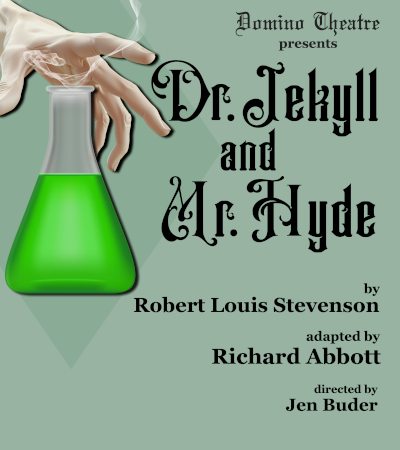Disturbingly Congenial and Delightfully Frightening: ‘Dr. Jekyll & Mr. Hyde’

Whether you recognize it from the theatre, the cinema, the Victorian novella, or the iconic Arthur song, the Strange Case of Dr Jekyll and Mr Hyde is an enduring cultural touchstone. With a healthy mix of good and evil, fantasy and drama, this story provides the perfect recipe for a spooky autumn play—which means it’s arrived at Domino Theatre just in time.
Based on Robert Louis Stevenson’s 1886 gothic horror novella, Richard Abbott’s 1941 stage adaptation, Dr. Jekyll & Mr. Hyde, is set in the 1940s and follows respected scientist Dr. Henry Jekyll (Don Mitchell) as his secret experiment with human nature goes awry. Directed by Jen Buder, Domino’s production features some strong performances and melodramatic moments while touching on deeper themes of reputation, power, and denial.
Dr. Jekyll’s house in London (set design by James Gow) is the centre of the action. As characters congregate on the main floor, Jekyll’s secret laboratory hovers above, out of view of his visitors but always visible to the audience. The lighting design (David L. Smith) in most of the scenes seems a touch too bright, not quite evoking the warmth and intimacy of an indoor space. However, when the narrative takes a sinister turn and the lights go low, the effect is excellent—the perfect level of drama, accompanied by ominous strings (sound design by Kim Coffman-Dressel) which evoke old-fashioned horror movies.
The play starts off at a somewhat meandering pace as Jekyll’s lawyer, Mr. Utterson (Michael Donnelly) turns up at his house, followed by Jekyll’s friend Dr. Lanyon (Anne Marie Bergman), who is also concerned about the reclusive doctor’s wellbeing. Things get more exciting when we first see Edward Hyde (Don Mitchell), who appears downstage in a dramatic reenactment as Utterson’s cousin, Richard Enfield (Will Mercer), describes Hyde trampling an unfortunate child (Evelyn Donnelly) in the street. Moments like these, where conversations on one part of the stage are punctuated by physical action elsewhere, are some of the most effective in this production.
The role of Dr. Jekyll/Mr. Hyde demands dexterity, and the ever-impressive Mitchell is up to the task, giving a disturbingly congenial performance as Jekyll and a delightfully frightening one as Hyde. Mitchell’s physical antics are great fun to watch—those somersaults!—and his vocal work is likewise impressive, with the low, almost animal growl of Hyde’s voice carrying clearly through the theatre.
The show sometimes feels hampered by the script, a rather anticlimactic two-and-a-half hour adaptation of Stevenson’s novella. In addition to setting it in a new time period, Abbott injects a tepid romantic plot into the story, inventing a 20-year-old love interest, Diana Carew (Ashley Miller), for the middle-aged Dr. Jekyll, and forcing a love triangle with the younger Mr. Enfield. This tangent is trite and goes pretty much nowhere, and is made worse by the bizarre chemistry between the actors—Mitchell’s affection toward Miller lands somewhere between patronizing and downright paternal, and the ick factor of it all is amplified by Miller’s simpering, adolescent performance as Diana.
However, one of Abbott’s inventions—the transformation of Hyde’s butler, Poole, into a housekeeper, Pauline (Shannon Donnelly), along with the addition of a cook, Bridget (Lorna Jodoin), and the neighbours’ maid, Connie (Hayley Scanlan)—gives rise to lively, comedic moments while adding another layer of social critique to the play. Pauline and Bridget are rightfully frightened by the violent happenings that keep going unexplained, and Jekyll is determined to keep everyone from talking about the situation—especially the supposedly hysterical servants.
As Jekyll admonishes and discredits the women for ‘gossipping’—aka telling the truth about Hyde’s behaviour and getting close to uncovering his true identity—it becomes clear that even the doctor’s ‘good’ side is not so good, and that his power to conceal his evil deeds relies on the silence of those around him. As Pauline, Donnelly has some particularly strong moments where the fear and anger at her predicament simmer under the surface of her subordination to Jekyll. These power struggles illustrate the tension that arises in situations where violence is repeatedly swept under the rug.
While the antique setting, fantastical premise, and glowing green beaker up in the laboratory are appealing trappings, the power of Dr. Jekyll and Mr. Hyde comes from the way it explores reputation and secret-keeping. Notwithstanding some strange choices on the part of the playwright who adapted Stevenson’s novella, Domino Theatre brings this classic tale to entertaining and thought-provoking life.
‘Dr. Jekyll and Mr Hyde’ plays at Domino Theatre through November 2, 2024. Tickets and more information can be found here.